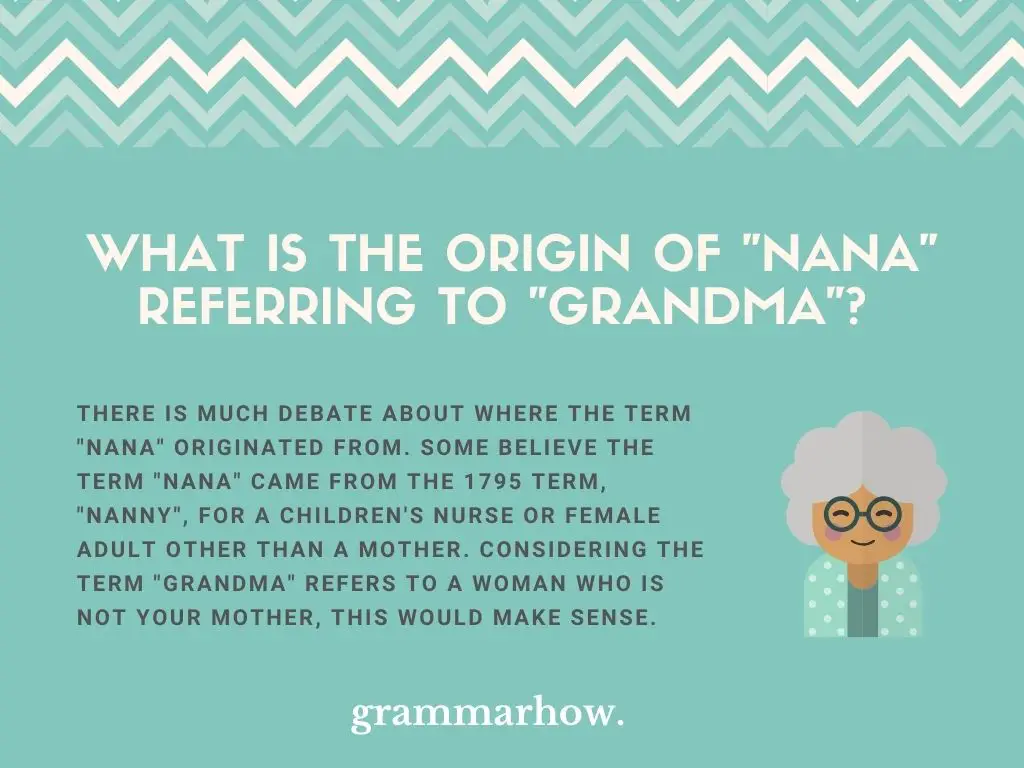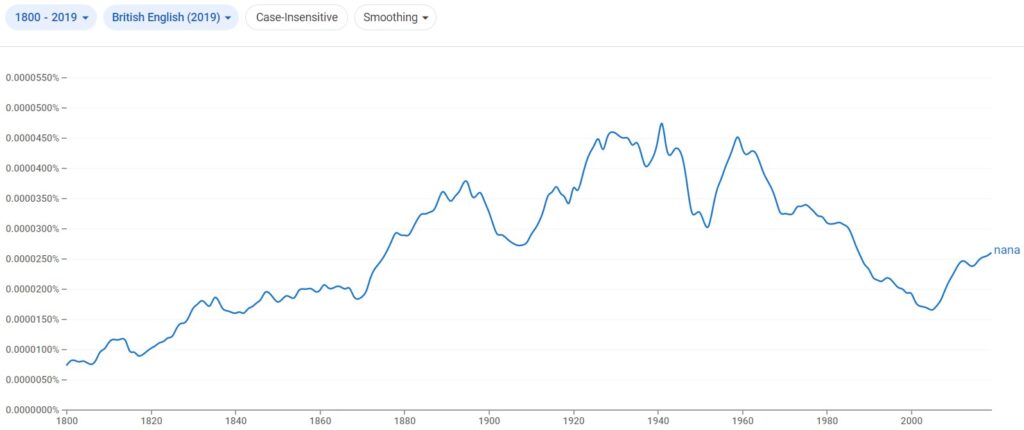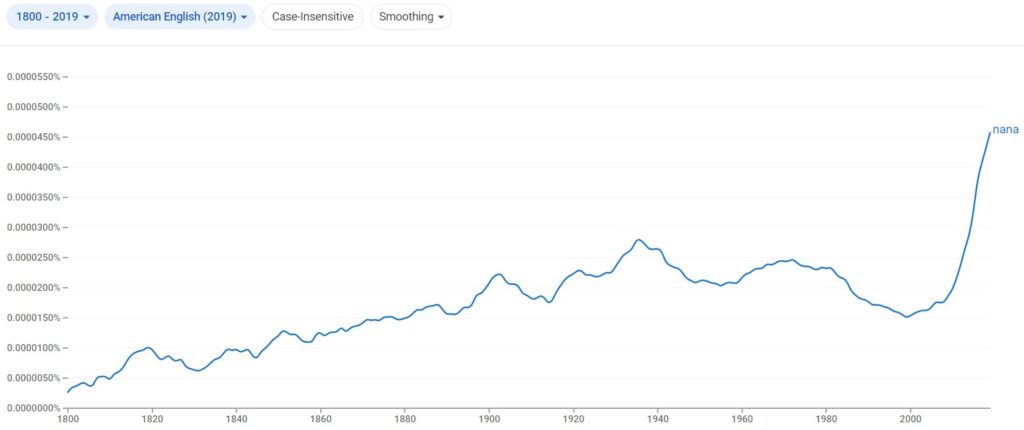While many of us refer to our maternal or paternal grandmother as our “Grandma”, it is also very common to utilize the term “Nana”. This often begs the question – where did the term “Nana” originate and what countries use this term in particular?
What Is The Origin Of “Nana” Referring To “Grandma”?
There is much debate about where the term “Nana” originated from. Some believe the term “Nana” came from the 1795 term, “nanny”, for a children’s nurse or female adult other than a mother. Considering the term “Grandma” refers to a woman who is not your mother, this would make sense.

However, others believe that the term derived from the Italian term “Nonna”, then being adapted to “Nana” in the English language. Consistently, there is thought that the term “Nana” is derived from the term “Nain”, which refers to a “Grandma” in the Welsh language.
At the same time, some folks believe that “Nana” is merely a simpler way for young children to say “Grandmother” or “Grandma” – similarly to how “Mama” is the shortened or first version of the term “Mother”. Because it is easier for young children – specifically toddlers – to say, it became a very commonly used nickname or shortened form.
The same could be said for children who have multiple “Grandmothers”, as “Nana” became another term to use to distinguish between two different women, as opposed to calling them both “Grandma”.
What Does “Nana” Mean?
The term “Nana” is generally used to refer to the mother of one’s father or mother. As we can see, Cambridge Dictionary defines the term “Nana” as a children’s word for a grandmother. Therefore, when we hear the term “Nana”, it is commonly being used to refer to someone’s “Grandma”.
However, Oxford Learner’s Dictionaries defines the term “nana” as an informal or slang, old-fashioned British term for a stupid or foolish person. Although, this particular use of the term is quite outdated and regional-specific.
What Is The Difference Between “Nana” And “Grandma”?
There truly isn’t much of a difference between the terms “Nana” and “Grandma”. Both terms are considered to be a nickname or reference to a person’s “Grandmother”. In some cases, when children have multiple “Grandmothers”, they will refer to one as “Grandma” and the other as “Nana”.
At the same time, there are parts of the world where the term “Nana” or “Nan” are far more commonly used than the term “Grandma” and vice versa. However, this does not affect the actual definition of the terms.
Is It “Nan”, “Nana” or “Nanny”?
All three terms, “Nan”, “Nana” and “Nanny” can be used to refer to a “Grandmother”. Much of the time, the specific term that we utilize is dictated to us from childhood in order to save on any confusion. This is especially true in terms of children who have multiple “Grandmothers”.
However, it is important to note that more commonly than not, the term “Nanny”, is used to refer to a children’s caregiver. As we can see, Cambridge Dictionary defines “Nanny” as a person whose job is to take care of a particular family’s children or a children’s word for “Grandmother”. Therefore, this particular term has multiple definitions and can be used to refer to both.
Much of the time, the particular term(s) we use to refer to our “Grandmothers” are influenced by the country in which we reside. In Canada and America, the terms “Grandma” and “Nana” are both very commonly used, whereas in England, Ireland, and Scotland, the terms “Nan” or “Granny” or more popular.
Is “Nana” Used The Most In The UK Or The US?
The term “Nana” is used quite commonly in both the UK and the US, however, according to Google Ngram Viewer, “Nana” appears to be more popularly utilized in the US, in the present day. However, this was not always the case.

As we can see by the graph, the term “Nana” was not always commonly used in the US. It had slowly grown in popularity from the 1800s to the 2000s, facing a few setbacks in popularity here and there. Although, the term “Nana” had a massive increase in popularity during the 2000s to the present day.
In terms of the UK usage of the word “Nana”, there has been a lot of fluctuation in overall popularity, as shown by Google Ngram Viewer. “Nana” steadily increased in use from the 1800s to the 1960s and similarly to the US usage, faced minor setbacks along the way.

However, in terms of present-day use, the commonality has decreased significantly. Since the 1960s, the use of this term had fallen and it wasn’t until around 2005 that it began increasing again. Although, the current use of the term is still much lesser than that of the US.
Which Languages Say “Nana” For “Grandma”?
Depending on the country of residence and the native language(s) spoken, the term “Nana” may be used in place of the term “Grandma”. This is especially the case for most English-speaking countries, where the term “Nana” receives the most use.
Some examples of English-speaking countries that utilize the term “Nana” or the shortened version, “Nan” in place of “Grandma” are Canada, the United States, the United Kingdom, Australia, Scotland, Ireland, and Britain. Similarly, in Wales, or when speaking Welsh, the term “Nana” is written and pronounced as “Nain”.
However, there are other variations of the term “Nana” that are used in non-English-speaking countries. For example, in Italian, the term “Nonna” is considered to be consistent or the origin of the term “Nana”.
In other languages, there are many other versions of “Grandma” or “Nana” utilized. We will now go over some of the various other forms of the term “Nana” or “Grandma”:
- In India, “Nana” is “Awa”
- In Germany, “Nana” is “Oma”
- In Spain, “Nana” is “Abuela”
- In Kenya, “Nana” is “Bibi”
- In Brazil, “Nana” is “Avo”
- In South Korea, “Nana” is “Halmoni”
- In Israel, “Nana” is “Savta”
- In the Philippines, “Nana” is “Lola”
- In Greece, “Nana” is “Yaya”

Martin holds a Master’s degree in Finance and International Business. He has six years of experience in professional communication with clients, executives, and colleagues. Furthermore, he has teaching experience from Aarhus University. Martin has been featured as an expert in communication and teaching on Forbes and Shopify. Read more about Martin here.
